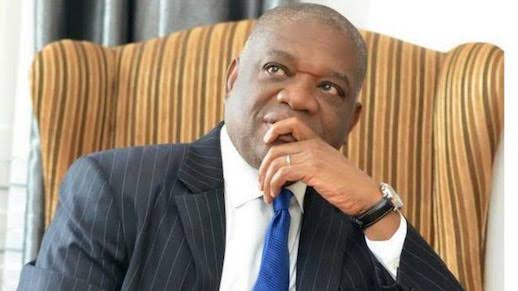Education
ASUP Tasks TETFund on New Intervention Line in Curriculum Devt

The Academic Staff Union of Polytechnics (ASUP) has called on the Tertiary Education Trust Fund (TETFund) to open a fresh intervention line in the direction of curriculum development to better advance polytechnic education in the country.
The ASUP National President, Anderson Ezeibe, disclosed this in Abuja on Thursday at at a Two-Day interactive session between TETFund and unions of beneficiary institutions.
Ezeibe said that curriculum development was an integral part of tertiary education that foster functional and impactful tertiary education.
Expressing dissatisfaction at the way the Fund sets up its committee without involvement of the polytechnic unions, he said this should be corrected to enhance effective participation.
According to him, there has been an increased participation of trade unions in the activities of TETFund. It is within this period that we see unions getting involved in monitoring activities of physical projects sponsored by tetfund in tertiary institutions.
He also expressed worry at the spate of abuse of the release of funds by TETFund to institutions management.
“These activities are eye opening events but it can only get better because the feedback from these engagements are in the processes and TETFund can only improve their impact in the education sector.
“This particular monitoring exercise should go beyond physical infrastructure projects. I know that TETFund is involved in other interventions lines of staff trainings development, research and planning and so on.
“At this level, we still have a significant level of abuse at the institutional level and it is only the involvement of the unions that can check this.
“Therefore it is very important that tetfund should design a policy position to ensure trade unions are involved in the level of monitoring and evaluation in the institutions,” he said.
Ezeibe also charged TETFund to include the trade unions in its programmes and project for accountability and delivery of its projects in the tertiary institutions.
“We call for a better inclusion of our sector in the strategic committee of TETFund. Our position is that you cannot build capacity by exclusion.
“The continued exclusion of our sector from the committee of TETFund will continue to undermine capacity building in our sector and also the capacity of the sector to actively compete in the areas of research fund,” he added.
He blamed abuse of TETFund’s project in tertiary institutions on stakeholding activities undermining the impact of the Fund’s projects.
“We have not been very happy with TETFund with respect to its committee on Research and Development.
“One has expected that the outcomes of those engagement would have progress beyond the level that they were left because some of the considerations from that committee were something we believe will enrich the intellectual community of our sector.
“It is important to know that stakeholding activities are undermining the activities of TETFund and in contradiction to see TETFund associate with stakeholding activities that undermine its own impact.
” We have six centres of Excellence in different polytechnics, one in each geopolitical zone, the one in my institution is centred around ICT.
“Unfortunately the report is that due to the scavenging activities of stakeholding arrangements that participate, the centres cannot function effectively, equipment were dumped, centre of excellence for ICT is there dormant because the initial plan has not met its own need,” he said.
In his address, the Executive Secretary of TETFund, Sonny Echono, stressed the need to consistently engage and challenge one another on how to better improve the institutions.
Echono said that the engagement was also for the purpose of sustaining steady growth and development of tertiary education.
“It is our fervent hope that this interactive session will provide an enabling environment for us to understand some of our challenges and difficulties in the delivery of quality education in our institutions.
“Thereby making meaningful contribution to the successful execution of the objective of the Fund.
“As you all know our primary mandate is to rehabilitate, restore and consolidate tertiary education in Nigeria, using funding alongside project management.
“The session is also expected to serve as a platform to discuss and mitigate incidences of industrial disputes in the tertiary education sector and look at ways to prevent and avoid their occurrences,” he said.
Echono also explained that the interactive session would afford the opportunity to build and solidify cooperation and collaboration between the Fund, its beneficiary institutions and the unions on matters that affect the growth and development of tertiary education.
“I believe that this interaction will bring up issues of concerns that will not only enable us address the areas of intervention in our institutions.
“It will also espouse gaps and shortcoming that have resulted in strikes and interruptions of academic sessions, with a view to mitigating them,” he said.
He called for urgent need for all stakeholders to unify efforts to reposition our tertiary institutions for the challenges of the times, especially in dealing with strike actions in the institutions.
“Studies have shown a link between poor student performance and industrial strike by unions. The arguments generally are that the quality of teaching and learning will significantly improve when teaching and learning are uninterrupted.
“Furthermore, building world class institutions requires a consistent and regular academic calendar and this is often affected by industrial strikes.
“However, a closer look will also show that many industrial strikes by the unions were for the improvement in teaching and learning conditions for both staff and students.
“It is for these reasons that sessions like this are organised to deliberate and find common grounds on issues of mutual interest and benefits,” he added.
Also, the former President, Nigeria Labour Congress (NLC), Ayuba Wabba, SA there was need for unions to get involved in decision making processes of tertiary institutions so as to realise the dreams of the Fund.
In the same vein, Michael Adaramoye, National Mobilisation Officer, Education Rights Campaign(ERC) called on stakeholders to address the growing trend of school fees increment.
Adaramoye said the country is moving to the stage where even lecturers would not be able to pay for the fees of their children if the situation is not looked into.
He said that the responsibilities of running institutions should be the burden of the government, hence must not be transferred to the students.
He, therefore, charged the government to take up the responsibility stressing that they(government) have more to benefit than the students.
The event also has stakeholders from the Colleges of Education (COE) and the Civil Society Organisations (CSOs)( NAN)
Education
How female Medicine Degree Holder Abandoned Certificate for Carpentry- Bugaje

The Executive Secretary, National Board for Technical Education (NBTE), Prof. Idris Bugaje has expressed the need to promote inclusivity, especially for women and persons with disabilities in technical education.
Bugaje stated this in Abuja while assessing the impact of President Bola Tinubu’s administration after two years in office.
He appealed for greater gender inclusivity in vocational and technical education, stressing that deliberate policies such as scholarships and incentives could help bridge the gender gap.
In support of his position, Bugaje shared an inspiring story of a female medical doctor who abandoned her medical career to pursue carpentry.
“There is a story I want to share with you, about a girl who was interested in becoming a carpenter.
“The father was a carpenter and they were four children in the family, three boys and herself.
“Whenever she joined the boys to the workshop, the father would send her away, saying, `you are a girl, go back to the house, you are not supposed to be a carpenter’’.
“Without giving considerations to the passion of the young girl, the father sent her to a medical school.
“She graduated with the MBBS, went and did the one-year internship after graduation, and chose a role as a medical doctor.
“After that, she came back to the father, returned the MBBS certificate to him, and thanked him.
“Afterward, she told the father that her passion is in carpentry, not to practice as medical doctor,” Bugaje narrated
He added that after spending seven years on medical training, the father had no option but to send her to Turkey to learn how to make furniture.
Addressing cultural and societal barriers often faced by young women in technical fields, Bugaje appealed to parents to support their daughters’ interests in trades like plumbing, electrical installation, and carpentry.
He also called on policymakers to prioritise passion and skill development among youth, especially girls, noting that such encouragement could lead to greater innovation and self-reliance.
“If they want to become carpenters, ICT experts, or POP artists, allow them.
“In skills’ training, passion is very important. That’s what motivates children and helps them innovate.
“We need to harness these innovations if the country is to move forward and rise beyond being a third-world nation,” he said.
He emphasized the need to have deliberate policies to encourage women to come into TVET through scholarships and other incentives. (NAN)
Education
WAEC Apologies for Conducting English Exam Late, Cites Leakage Prevention

The West African Examinations Council (WAEC) has apologized for delay in conducting English Language Paper 2 in the ongoing 2025 West African Senior School Certificate Examination (WASSCE).
The took place on Wednesday evening.
In a statement by Moyosola Adesina, Acting Head of Public Affairs Department of
WAEC, the council said that it encountered challenges.
”While maintaining the integrity and security of our examination, we faced considerable challenges primarily due to our major aim of preventing leakage of any paper.
“We recognise the importance of timely conduct of examinations and the impact of this decision on candidates, their schools and parents, and we sincerely apologise for any inconveniences caused,” WAEC stated.
It said that it successfully achieved its objective but it inadvertently impacted the timeliness and seamless conduct of the examination.
“In spite of our best efforts, we encountered logistical hurdles, security concerns and socio-cultural factors that negatively influenced our operations,” WAEC said.
The council re-affirmed its commitment to upholding the highest standard in examination conduct, and pledged to continue to promote academic excellence. (NAN)
Education
FG vows full WAEC CBT shift by 2026 – Minister

The Minister of Education, Dr Tunji Alausa, has reaffirmed the Federal Government’s commitment to fully transitioning to Computer-Based Test (CBT) examinations for the West African Examinations Council (WAEC) and other exam bodies by 2026.
Dr Alausa made this known while monitoring the conduct of WAEC’s CBT examinations in Abuja on Wednesday.
He expressed optimism about Nigeria’s capacity to modernise its examination system and reduce widespread malpractice through digital innovation.
Commending WAEC’s initiative, the minister described the shift from traditional pen-and-paper exams to CBT as a historic and crucial step toward fairness and educational integrity.
“We are working very hard to eliminate fraud in our exam system, and WAEC is taking the lead,” he said.
Highlighting the advantages of CBT, Alausa noted that the system simplified the exam process while significantly curbing cheating.
“We now have clear evidence that when exams are done using technology, the level of fraud is minimised to almost zero,” he stated.
He further lauded WAEC’s internal safeguards, explaining that the CBT system was operated via a secured Local Area Network (LAN), making it “literally impossible” to hack.
According to the minister, by Nov. 2025, all WAEC multiple-choice exams will be conducted using CBT.
He added that essay questions and NECO examinations would follow suit by 2026.
On infrastructure and logistics, particularly in remote areas, Alausa acknowledged the challenges but assured that scalable solutions are in progress.
“Are we going to be ready to provide every single needed infrastructure by November? Absolutely not.
“But as we move into the future, we will be ready. We have to challenge ourselves as government,” he said.
He also addressed concerns over the logistics of conducting multiple exams.
“In WAEC, the average student takes about eight to nine papers.
“They do it over several days. Those are the logistics we, as administrators, have to work through, and we already are,” he explained.
The ongoing WAEC exams, which began on April 24, are scheduled to conclude on June 20, 2025.
A total of 1,973,253 candidates from 23,554 schools are participating. Of this number, 979,228 candidates are male, accounting for 49.63 per cent, while 994,025 candidates are female, making up 50.37 per cent.(NAN)




















